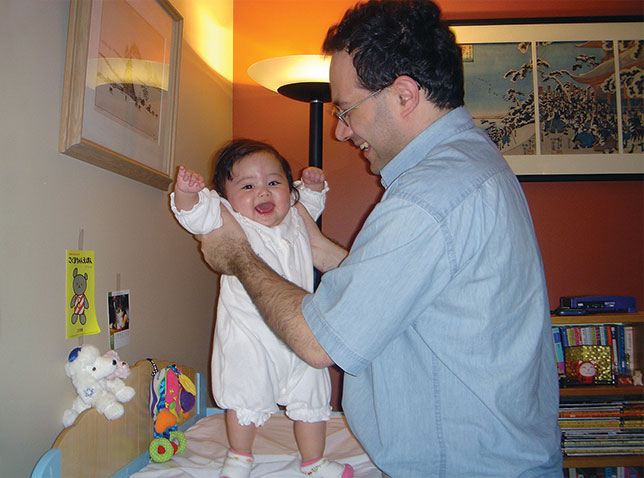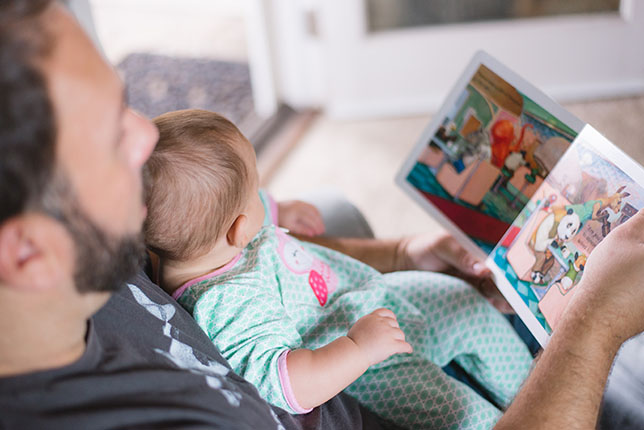Danny Leznoff was the first male in Simon Fraser University’s chemistry department to take parental leave after the birth of his child, something he has done twice. Early in the new millennium, Dr. Leznoff says his experience at SFU was at “the pointy edge of the wedge university-wide.” His first daughter, Sayako, was born in July 2004. Having recently received tenure, the associate professor took paternity leave for four months – one term – that September. But he wasn’t originally planning to take time off at all.
In anticipation of the birth of his first child, Dr. Leznoff approached his department chair to rearrange the timing of a course he was scheduled to teach that fall. His goal was to change it from a 50-minute lecture taught three times a week to a three-hour class that met once a week. Reasoning that these logistics would streamline commuting so he could spend more time at home, he had every intention of continuing to teach after his baby arrived – he didn’t want to inconvenience his colleagues by diminishing his teaching load. “It really hadn’t occurred to me to ask for parental leave,” says Dr. Leznoff.
Dr. Leznoff distinctly remembers his conversation about reconfiguring course scheduling with his department chair at the time, Mario Pinto. “He said, ‘No Danny, you should go on leave. Don’t worry about your class, we’ll handle it. Go take care of your kid,’” Dr. Leznoff recalls. So that’s what he did. Reflecting on that decision this past spring while on sabbatical and in lockdown with his family in Lyon, France, he remembers the time fondly. “It was a special experience.”
Access to employment leave opportunities for all co-parenting partners, not only mothers – who face a well-recognized set of challenges – is relatively new in Canada. Since 2015, the “other parent” (typically the father) can take up to 35 weeks of paid leave if the parental leave is shared between the parents. Additionally, as of March 2019, the other parent – the person not taking the main parental leave after the birth or adoption of a child – has the option of taking a separate five to eight weeks of paid parental leave. How is academia facilitating this shift and acknowledging changing gender roles in parenting?
“Mothers are much more likely than fathers to take parental leave in the first months of a child’s life, which has the potential to hurt mothers’ careers,” writes Cornell University’s Ankita Patnaik in her 2018 paper in the Journal of Labor Economics. With gender gaps in pay and in unpaid work in the home, “men’s participation in parental leave and care work has attracted growing public attention,” she writes. Several nations have introduced policies to promote fathers’ participation in paid parental leave programs, such as “daddy quotas” that reserve some parental leave exclusively for fathers. Such policies are motivated by the idea that active fathering benefits child development, improves fatherhood satisfaction, and strengthens women’s career development by enabling an earlier return to work, which, in theory, helps to erode one rationale for gender discrimination in the workplace.

In Canada, one region stands out as a policy trailblazer on parental leave for fathers. The Quebec Parental Insurance Plan (QPIP) was introduced in 2006, well before the federal plan. One of its explicit purposes: boosting fathers’ participation in paid parental leave.
Dominique Roche, a Marie Curie Global Fellow at Carleton University and Switzerland’s Université de Neuchâtel, works in Ottawa, but lives with family across the river in Quebec. He and his partner, also an academic, had their first child in Switzerland in November 2016. There, Dr. Roche officially had three days off work. “Fortunately, my boss at the time was very family-oriented and told me to take whatever time I needed.” Dr. Roche took 10 days off. He found himself in a very different position when their second child was born in Canada two years later in September 2018.
Dr. Roche says he did not experience any negative attitudes about taking paternity leave. He notes that “In Quebec, it’s very well respected that fathers can take time off.” That said, he took only a short time off. It was more advantageous, financially and practically, for his wife, a newly appointed faculty member, to take a longer parental leave, he explains. She had spent the first year of her new job setting up a lab, applying for funding from the Natural Sciences and Engineering Research Council (NSERC) and the Canadian Foundation for Innovation, plus teaching. “Maternity leave for her was very welcome, and at the same time, we figured there are not that many opportunities to take time off and not feel all that guilty about it,” Dr. Roche says.
His time off in 2019 was no ordinary paternity leave. It was a family adventure. “We enjoy travelling and were thinking of going to Latin America,” he says. They looked for a place safe enough to bring the kids – assessing their options based on data about tropical diseases, crime rates and political stability – and opted for a trip to Argentina, Uruguay and Chile from mid-February to mid-March, with a two-year-old child and a five-month-old infant in tow. They were joined on the trip by Dr. Roche’s brother, who was also on paternity leave, and his family too.
“We figured there are not that many opportunities to take time off and not feel all that guilty about it.”
Dr. Roche now waxes lyrical about the trip, recalling a 12-hour hike near Bariloche, Argentina, to the base of Tronador, an extinct volcano in the Andes. Playing en famille in Chilean hot-water mud puddles, and fishing for salmon with his toddler in Patagonia are a few other treasured memories from what Dr. Roche calls a “trip of a lifetime.” He did bring along his laptop, but felt no guilt about taking time off.
Such smooth sailing is not always typical. Institutional, federal and provincial provisions for paternity leave by faculty have become the norm even outside of Quebec. Yet, in reality, mechanisms and supports for faculty, postdoctoral fellows and students wanting paternal leave don’t always exist, or have only recently been put into place.
One Canadian academic, who does not wish to be named, struggled to navigate the right to and timing of paternity leave at his large institution in Ontario. For the first of his three children, while a postdoctoral fellow, there were no provisions at all for health benefits or leave for postdocs. Following what he saw other young academics doing at the time, he returned to work the day after they returned from the hospital. “I did what the workplace culture at the time expected of me, which was zero leave as a postdoc and to return ‘as soon as mom and baby are comfortably settled in at home,’” he says.
For his second child, by which time he had secured a faculty position, he had one month’s leave. “The first month of a child’s life is mostly sleeping and being breastfed by mom. So, from a caregiver perspective, to only have that one month of leave and then go back to the long hours of an academic job was extremely unsatisfying,” he says.

His third child came along during the 2000s, when a four-month paid leave was available at his institution. For financial reasons, he and his partner planned to stagger leave into alternating four-month chunks. The university refused his deferred leave request, saying leave must begin on the child’s birth date. Such was the language of the collective agreement, so the union couldn’t help him out. Fortunately, he found respite and flexibility from his department chair, who offered to permit him leave through an informal agreement kept off the books. He suspects the gender and parental status of his chair – a mother herself – was critical in allowing this discretionary, informal arrangement. Going forward, whenever the union was reviewing its collective agreement, “I brought this up,” he says. It took years of advocating on behalf of fathers and the same-sex partner who does not give birth for a more flexible policy to come into effect.
The situation for graduate students has also improved. In 2001, NSERC administrators were surprised when Trevor Pitcher, a graduate student at the University of Toronto, applied for paternity leave after his daughter was born during the second year of his PhD. NSERC paid him an extra stipend for four months, advising him that he could not concurrently work on his thesis. Returning to PhD work after paternal leave and with his partner still at home, Dr. Pitcher, now a professor in the department of integrative biology at the University of Windsor, earned extra money for rent and diapers in a weekend job replacing windows in skyscrapers.
Richard Schuster, an adjunct professor at the University of Northern British Columbia, struggled to find postdoctoral grants that permitted part-time research so that he could alternate as primary caregiver with his physician wife when their three kids – now 2, 4 and 6 – were born. He was ineligible for government postdoctoral positions after taking a caregiving gap, but managed to negotiate a part-time postdoctoral position within the Liber Ero Fellowship Program, beginning in 2016, which allowed him to work just two days per week. It was the first arrangement of its kind for the program. But being a part-time, stay-at-home academic dad wasn’t easy from a practical, logistical or financial standpoint. “Most people wouldn’t say outright to you that this is weird,” Dr. Schuster says, but it was an issue.
Even more recently, there are universities in Canada where allowances for paternal leave are unclear. Psychology postdoc Cristian Gutierrez looked into parental leave options at the University of Alberta well before the birth of his son in October 2019. “I found out that there were not really any provisions [for postdocs],” he says. University administration indicated that postdoctoral parental leaves were a grey area. At the time, a postdoctoral fellow’s ability to take paid paternity leave varied depending upon the source of their funding, and fellows were not considered university employees with benefits. That has since changed. Now, with his position funded by NSERC, Dr. Gutierrez began paternity leave in April 2020.
As Christine Seguin, media and public affairs officer with NSERC explains, the granting council offers an extension of funding for up to two years to Discovery Grant holders to ease the transition from parental leave to work. Funding allows recipients’ research programs to continue while they are on leave by supporting research personnel, including grad students, and paying for various research-related costs. In the 2019 federal budget, the Canadian Institutes of Health Research, the Social Sciences and Humanities Research Council and NSERC jointly announced that the duration of paid parental leave for graduate students and postdoctoral fellows was being doubled from its previous amount. The maximum duration is now 12 months, up from six, and applies to holders of a graduate scholarship or postdoctoral fellowship, as well as those paid from a supervisor’s agency grant.
For men in the Canadian academic environment, paternity leave is increasingly common. Rupinder Brar, a professor of physics and astronomy at Ontario Tech University, stayed home while his partner returned to work with her child psychology laboratory at Ryerson University after giving birth to their two sons, now 9 and 6. “I was more than happy to spend time with an eight-to-12-month-old,” Dr. Brar says. “That [age] really is a sweet spot as far as I’m concerned. It’s just the greatest time to have them,” he says, noting that it’s a time when infants are sitting up, beginning to form words and to walk. “It’s a wonderful time to be with the kids,” he says. At the time, he wasn’t aware of anyone else at his institution taking paternity leave. Nevertheless, “It was pretty seamless as far as HR or my dean was concerned.”
“Over the last decade, the changes have been extraordinary.”
“There was nothing out of the ordinary or unusual,” he says, “but it did feel like kind of a newish thing.” Since then, many of his colleagues have taken paternity leave for extended periods. His institution, he thinks, may lack “old school” parenting ideas and stigma against men taking caregiving leave because it’s relatively young (the university welcomed its first class in 2003). In everyday life, however, Dr. Brar has observed that public perception has yet to normalize dads as caregivers. When performing routine parenting duties, “a male will get accolades for it, while a woman could do the very same thing and have feelings of not doing enough,” he says. “If anything I think I’m overly heralded for doing things that are rather basic parental duties.”
As holder of the Canada Research Chair in Gender, Work and Care at Brock University, Andrea Doucet researches the caregiving experiences of fathers and society’s attitudes towards fathers as caregivers. Dr. Doucet has studied paternity leave for 30 years, and collected much of her research in Do Men Mother?, a book about caregiving fathers and stay-at-home dads. “Canada has some policy work to do,” Dr. Doucet says. Fortunately, she adds, Quebec has a good model in the Quebec Parental Insurance Plan that could be scaled up on a national level. With higher wage replacement rates and “use it or lose it” leaves modeled on Scandinavia, it’s a leave that gives men negotiating power with bosses, she argues. In interviews, fathers in Quebec are reporting that taking the five-week leave is “a no-brainer.”
Such policies are an important instrument to speed up cultural and social change. And many academic fathers are particularly privileged with generous leave benefits at their institutions, so there’s no practical reason why they shouldn’t use them, Dr. Doucet argues.

Within the university milieu, caution may be warranted around some policies intended to balance family and career. A 2018 study of economics professors in the United States suggests that a gender-neutral policy that stops the tenure clock for a year following the birth of a child, regardless of the professor’s gender, may have inequitable consequences. The dataset revealed that the policy advantaged men more than women in subsequent tenure rates, with the men publishing more often in top-tier journals. If the benefits are equal, but the costs (like physiological costs of childbirth) are different, “then it might not be as beneficial for women,” says Kelly Bedard, co-author of the study and an economics professor at the University of California Santa Barbara. However, the outcomes for similar policies in “other disciplines might be quite different,” she cautions. Dr. Doucet also cautions that “we don’t have all the information” to interpret this study, “including what the child-care situation was.”
Many questions about the impacts of paternity leave remain. What amount of time is beneficial? Should policies be written as gender neutral? How do class and culture factor in? How do we even measure the impacts of caregiving leave for fathers? “There is this assumption that yeah, men take leave and everything is just fabulous,” Brock’s Dr. Doucet says, “but there’s not a direct causal link between men taking leave and everything being hunky dory.” Still, “over the last decade, the changes have been extraordinary,” she says. “A decade has made a huge difference.”
And to fathers who are considering paternity leave, Dr. Roche, the globetrotting postdoc at Carleton, has a word of advice: “If you have the opportunity, definitely take it.”


The union of support staff at UOttawa is currently on strike. One of the reasons is a cut to the parental leave. You can contact the union office at http://www.psuo-ssuo.ca/en-CA/contact-us.aspx